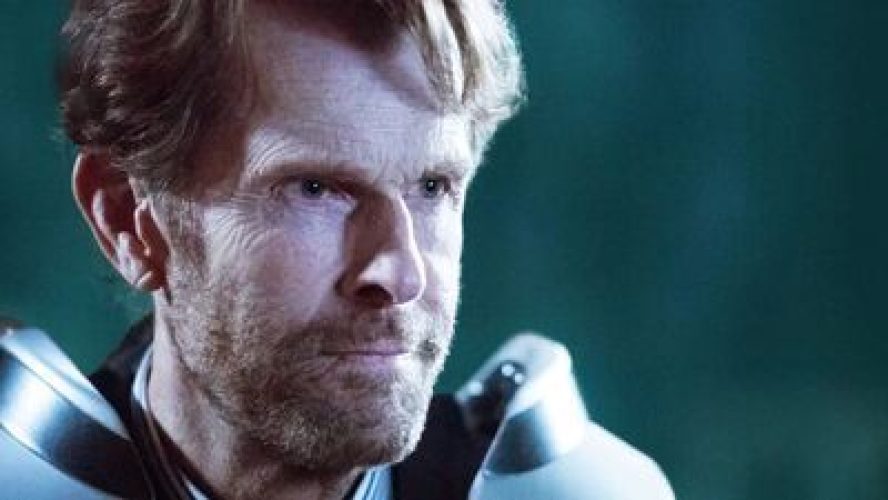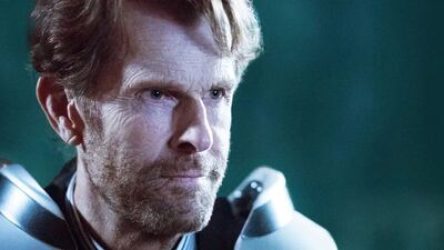On an unassuming Saturday morning in September 1992, Warner Bros. Animation introduced a new version of a beloved comic book character, and a voice-acting legend was born. That legend was Kevin Conroy, who inhabited the role of the DC Comics staple Batman and Bruce Wayne on the widely celebrated television show “Batman: The Animated Series.” Sadly, Kevin Conroy died last week after a short illness of cancer.
Born in Long Island in the mid-fifties, Conroy came from a broken home and left at seventeen to attend Juilliard to study under actor John Houseman. An early success was a recurring role in the soap opera “Another World,” along with several guest appearances in shows such as “Dynasty” and “Cheers.” Still, his legacy began when he won the role of Batman in 1992. Conroy would go on to play the character for the 85-episode run of that show. He also starred in the follow-up show “The New Batman Adventures,” and was an older Bruce Wayne in “Batman Beyond.” Later, he became a member of DC’s “Justice League” animated iteration.
Conroy also had the opportunity to play Gotham’s savior on the big screen when “Batman: Mask of the Phantasm” opened in 1993. Propelled by the immediate success of the animated series and initially set for home video, Warner Bros. rushed the picture to the big screen while under-marketing it. The box office results were disappointing, but many critics and fans consider it one of the best Batman movies. Roger Ebert and Gene Siskel praised the film upon its home video release.
“Batman: Mask of the Phantasm” is the perfect vehicle for Conroy’s remarkable duality in the show. It’s not just his Batman that stands out, with the ideal balance between gravitas and growling, but his performance of Bruce Wayne. Typically played as a mindless playboy to distract from his alter-ego, Conroy conveyed him as not only a playboy with a sense of humor but someone with a conscience. The performance matched the show’s writing, with Bruce using his considerable privileges to help others and assisting Batman’s investigations on the sly. One of Conroy’s best scenes is in “Mask of the Phantasm,” where he pleads at his parents’ grave to allow him to move on, but he’s talking to himself and the shadows he inhabits in his vengeful crusade. The moment gets right to the core of who Batman is, and Conroy’s performance is as powerful as they come.
While Conroy had a vast following as Batman, many still seemed unaware of his sexuality, having grown up hiding his life as a gay man. Though his identity was known to some when acting in New York City theaters, he felt ostracized when he jumped to the more prominent realm of live-action television. Conroy could not be himself, at least until Batman came along. He eventually came out publicly to the New York Times in 2016, but Conroy revealed his true story in “Finding Batman,” a story he wrote for the 2022 edition of the DC anthology comic book Pride.
“Finding Batman” told how Conroy found his voice for the character, stating: “I often marveled at how appropriate it was that I should land this role. As a gay boy growing up in the 1950s and ’60s in a devoutly Catholic family, I’d grown adept at concealing parts of myself. Of putting aspects of myself in a separate box and locking it away.” Conroy also explained the inspiration for the mindset of a man dealing with the death of his loved ones. He had already been living with it for years, thanks to AIDS.
That voice became a fundamental part of Batman’s history. Conroy began voicing the character in video games in 1994 when the Super Nintendo and Sega Genesis were the top dogs in consumer electronics; his last role was for 2016’s “Batman: Arkham VR,” part of the acclaimed “Batman: Arkham” series. And in 2019, he got to officially play Bruce Wayne in live-action, appearing in an episode of the “Batwoman” television series in Arrowverse’s “Crisis on Infinite Earths” event.
Conroy is survived by his husband, Vaughn C. Williams. The most poignant tribute to him was from Mark Hamill, who played opposite Conroy as the Joker. “I’m finding great solace in all the memories I have of him …” Hamill posted on Twitter. “The thrill of our earliest recording sessions, discovering the unique bond our characters shared, how we complemented one another & bonded immediately.”
A legion of fans also shared that bond. To so many, including this writer, his is the definitive version of Bob Kane and Bill Finger’s caped crusader, the one who has most inhabited the soul of the character to the point where you hear his voice whenever you read any Batman comic. That is Kevin Conroy’s legacy. He was the night.
On an unassuming Saturday morning in September 1992, Warner Bros. Animation introduced a new version of a beloved comic book character, and a voice-acting legend was born. That legend was Kevin Conroy, who inhabited the role of the DC Comics staple Batman and Bruce Wayne on the widely celebrated television show “Batman: The Animated Series.” Sadly, Kevin Conroy died last week after a short illness of cancer. Born in Long Island in the mid-fifties, Conroy came from a broken home and left at seventeen to attend Juilliard to study under actor John Houseman. An early success was a recurring role in the soap opera “Another World,” along with several guest appearances in shows such as “Dynasty” and “Cheers.” Still, his legacy began when he won the role of Batman in 1992. Conroy would go on to play the character for the 85-episode run of that show. He also starred in the follow-up show “The New Batman Adventures,” and was an older Bruce Wayne in “Batman Beyond.” Later, he became a member of DC’s “Justice League” animated iteration. Conroy also had the opportunity to play Gotham’s savior on the big screen when “Batman: Mask of the Phantasm” opened in 1993. Propelled by the immediate success of the animated series and initially set for home video, Warner Bros. rushed the picture to the big screen while under-marketing it. The box office results were disappointing, but many critics and fans consider it one of the best Batman movies. Roger Ebert and Gene Siskel praised the film upon its home video release. “Batman: Mask of the Phantasm” is the perfect vehicle for Conroy’s remarkable duality in the show. It’s not just his Batman that stands out, with the ideal balance between gravitas and growling, but his performance of Bruce Wayne. Typically played as a mindless playboy to distract from his alter-ego, Conroy conveyed him as not only a playboy with a sense of humor but someone with a conscience. The performance matched the show’s writing, with Bruce using his considerable privileges to help others and assisting Batman’s investigations on the sly. One of Conroy’s best scenes is in “Mask of the Phantasm,” where he pleads at his parents’ grave to allow him to move on, but he’s talking to himself and the shadows he inhabits in his vengeful crusade. The moment gets right to the core of who Batman is, and Conroy’s performance is as powerful as they come. While Conroy had a vast following as Batman, many still seemed unaware of his sexuality, having grown up hiding his life as a gay man. Though his identity was known to some when acting in New York City theaters, he felt ostracized when he jumped to the more prominent realm of live-action television. Conroy could not be himself, at least until Batman came along. He eventually came out publicly to the New York Times in 2016, but Conroy revealed his true story in “Finding Batman,” a story he wrote for the 2022 edition of the DC anthology comic book Pride. “Finding Batman” told how Conroy found his voice for the character, stating: “I often marveled at how appropriate it was that I should land this role. As a gay boy growing up in the 1950s and ’60s in a devoutly Catholic family, I’d grown adept at concealing parts of myself. Of putting aspects of myself in a separate box and locking it away.” Conroy also explained the inspiration for the mindset of a man dealing with the death of his loved ones. He had already been living with it for years, thanks to AIDS. That voice became a fundamental part of Batman’s history. Conroy began voicing the character in video games in 1994 when the Super Nintendo and Sega Genesis were the top dogs in consumer electronics; his last role was for 2016’s “Batman: Arkham VR,” part of the acclaimed “Batman: Arkham” series. And in 2019, he got to officially play Bruce Wayne in live-action, appearing in an episode of the “Batwoman” television series in Arrowverse’s “Crisis on Infinite Earths” event. Conroy is survived by his husband, Vaughn C. Williams. The most poignant tribute to him was from Mark Hamill, who played opposite Conroy as the Joker. “I’m finding great solace in all the memories I have of him …” Hamill posted on Twitter. “The thrill of our earliest recording sessions, discovering the unique bond our characters shared, how we complemented one another & bonded immediately.” A legion of fans also shared that bond. To so many, including this writer, his is the definitive version of Bob Kane and Bill Finger’s caped crusader, the one who has most inhabited the soul of the character to the point where you hear his voice whenever you read any Batman comic. That is Kevin Conroy’s legacy. He was the night. Read More


